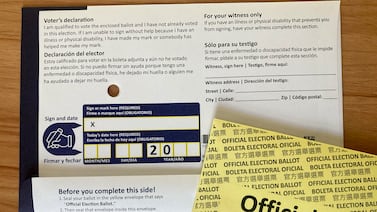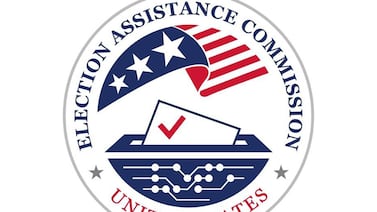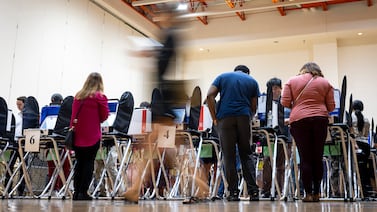Faced with a Republican majority intent on passing some of the most restrictive laws in the country, Texas Democrats did what they could over the spring legislative session to soften Senate Bill 7—until they had to pull the plug altogether.
“There comes a point where you just can’t take it anymore,” Rep. John Bucy, an Austin area-Democrat who serves on the House Elections Committee, told Votebeat.
After Republicans threw out all of the previously agreed upon concessions in a closed-door session at the very end of the term last weekend and refused to allow questions about provisions they’d added, they set out to pass a bill that was even more severe than originally proposed. So, hours before the close of the session, Democrats quietly trickled out of the house, leaving their desks one by one until almost 60 were empty. The Republicans, realizing they’d been played, were forced to end the session, lacking a quorum.
It has been easy for national media to portray the walkout as a dramatic act of clear-eyed organization in the face of doom, but it was a last resort and performed out of necessity. Activists and even elected officials in the state have long criticized the Texas Democratic Party for its lack of organization, which they say has cemented the party’s position in Texas as a weak, passive body that can move the needle only by leaving the floor.
The country has seen a slew of Republican-championed bills that would make voting harder in some form. Texas’ is, arguably, the most severe. Targeting large, urban counties with intense regulation and scrutiny, the bill would close polling locations that were opened to meet the needs of the pandemic, increase penalties — including criminal penalties — for election workers and voters who make errors, further restrict already-thin allowances for vote by mail in the state, and empower partisan poll watchers to be even more in-your-face. Voting in Texas was already a hassle, because voters have so few convenient options for casting a ballot and penalties are intimidatingly high for even basic mistakes made when voting. This bill would make voting harder and more intimidating.
The House and Senate both passed versions of the bill last month, with the House making far more compromises to accommodate the demands of Democrats. “The Senate version of the bill was so much worse than the House bill, and Democrats were actively contributing to the House bill in good faith,” said Bucy. But then, it all got thrown out the window.
The bill went into conference committee to sort out the changes. Although in other legislative bodies, including the U.S. Congress, legislators are generally unable to introduce brand new provisions at this stage, that’s not so in Texas. Republicans shut Democrats out of the conference entirely, and tossed most of the ameliorations they’d agreed to. Plus, they added 20 pages to the bill and refused to take questions from Democrats about their contents on the floor. Left with no ability to change the legislation or to stop it — Republicans already had the votes they needed to pass it — Democrats chose to walk out.
Southern Methodist University political science professor Cal Jillson agrees that Democrats had no other options. There were no legislative moves left to make, he said in an interview with Votebeat, and Republicans broke established precedent and perhaps the law by carrying their plan out in secret. “I do think rules were at least bent and the Democrats’ only remaining action was to break quorum,” he said.
The walkout set hair on fire across the country. Republicans demanded they be punished, and Republican Gov. Greg Abbott threatened to withhold their pay. Democrats outside the state demanded to know why such dramatic action hadn’t been taken sooner in order to spotlight the full horrors of the bill.
Democratic state Rep. Rafael Anchía of Dallas, who has been among the most ardent opponents of SB7, told Votebeat that critics have panned the party for not taking drastic measures, such as walking out of session, earlier in the year. But voting rights were not the only thing the legislature needed to address: Texas’s winter storms knocked out power for millions, for example, an urgent priority that Texans demanded redress for. “How do you execute that plan and leave for that long and then leave all of this other work that needed to get done undone?”
Democrats, he said, needed to actively participate in the entire session in order to move things like weatherization in front of SB7, so that SB7 could be delayed as long as possible while other crucial issues were addressed. “Imagine if the narrative today was that Democrats walked out and killed the bills dealing with the [power] grid and making sure that 4.5 million Texans aren’t left out in the cold and even more Texans don’t have clean water to drink?” he said. Voting might be the sexiest topic of the year, but “maybe fewer people freeze to death this winter.”
“You don’t deploy the full arsenal at once, because that just results in mutually assured destruction,” he said. Part of being in the minority, he said, is to do everything you can to advance your priorities before resorting to nuclear options. “Oftentimes that’s just not satisfying to the people who prefer to breathe fire.”
But more fire-breathing might be in the party’s future when Abbott convenes a special session so Republicans can have a second chance at passing legislation they have told voters is necessary to protect the integrity of elections. Bucy and other representatives I spoke to said Democrats are open to “staying away for as long as it takes.” In theory, Democrats could ask 51 of their members to head out of the state and simply refuse to participate, forcing the session to grind to a halt.
It’s a dramatic move, one that Texas Democrats have not taken in almost 20 years, largely because it subjects the offending legislators to arrest and jail time. In Texas, the Department of Public Safety can locate and detain members of the state legislature who refuse to return to the floor. In 2003, Democrats fled first to Oklahoma and then to New Mexico to evade the grasp of DPS in protest of redistricting maps they felt, and courts later ruled, were racist. Fifty one Democrats, this time around, would have to do something similar for weeks on end.
The probability of such a dramatic move depends on how Abbott chooses to handle the special session. By law, special sessions in Texas last 30 days. He says he’ll call them one at a time, to deal with a single piece of legislation, forcing the legislature to finalize the bill and vote on it before moving on to other issues.
If Abbott were to call a special session simply to deal with Republican priorities, such as voting restrictions and anti-trans bills, there is fundamentally little reason for Democrats to participate: Republicans need a simple majority to pass these measures, which they have. The only way to prevent the bills from passing would be to deny the legislature the ability to vote on them at all. But Abbott is a smart political animal. Activists and representatives I spoke to predict that he will likely compel Democrats to participate by weaving in popular bipartisan measures that were unaddressed in the normal session, such as teacher raises, aid for winter storm victims, and bail reform. In that case, Democrats would be unlikely to stay away, which would force them to sacrifice influence on these crucial issues.
The tricky part for Democrats will be gaming this all out in an organized way.
Anchía, like other representatives in the state, said he recognizes that Democrats need a solid strategy going forward, but he said he feels ready to tackle whatever comes in the special session. That was echoed by Bucy, who added that the walkout was evidence that “Democrats will do whatever it takes to prevent laws like these from passing,” and they’ll take that same zeal into special sessions, however many Abbott calls. “Republicans know we are serious about this.”
That show of seriousness will require leadership. No Democratic representative or activist I spoke to for this piece could point to a single, vibrant leader capable of keeping everyone under the Texas Democratic Party’s gigantic umbrella dry. While Stacey Abrams has galvanized Georgia’s Democrats against voter suppression in the state, turning out thousands to vote despite restrictive measures, no figure or group has emerged in Texas, where the laws are, indisputably, worse than in Georgia.
“Where is your Stacey Abrams? In Texas, there is no such person,” said Jillson. “I don’t see an immediate future for Democratic Party in Texas absent a personality as strong and as capable as Abrams. And if you don’t have that, then all you have is nature working its will demographically, and that takes a while.”
The media seems primed to adopt Beto O’Rourke as Texas’s answer to Georgia’s nationally famous voting advocate and former gubernatorial candidate. O’Rourke hit the campaign trail to advocate against SB7 this spring, but by the time he started ringing the gong about voter suppression in the state, it was too late. He’ll start a statewide tour to talk about voting rights this summer, even though it’s not clear when Abbott intends to call the legislature into special session to reintroduce the measure. The events listed are rallies and virtual deputy registrar training, the type of training local parties and counties already offer with regularity.
Many Democratic activists privately tell me they’re resigned to seeing a lackluster O’Rourke lead the way, even as they are growing tired of his schtick. Anchía thinks the criticism of O’Rourke is unfair, and that he has the power to be a unifying force in a state where Democrats sit under a massive tent. While in other states Democratic priorities are more aligned, Texas is a hugely diverse state racially, economically, and culturally. “I think he’s very talented and charismatic, and also very brave. He does it for me, I have to be candid,” Anchía said. “And yeah, you have to be a little glitzy and look like a Kennedy, which he does.”
Anchía said he was impressed with the organization O’Rourke is developing around voting, called Powered by People. While it would have been better if the organization had come earlier in the session in order to influence the trajectory of the bill, Anchía said they were hampered by the pandemic. “We just flipped the switch from being in an all-masked-up-no crowds frame,” he said. “I think they came late justifiably.”
Although Abrams clearly had far more success in Georgia, Anchía said Georgia was simply farther along the path that Democrats are walking in Texas now. “The gestalt of Georgia is farther right than we are, and Georgia required a couple of cycles” before national attention and money flowed to fuel the high turnout credited to progressive activists in the state. Anchía thinks Texas is next.
But Texas has been “next” for Democrats for a long time, and seems to be ignored until the very last minute quite often. President Joe Biden, for example, did speak out against SB7, calling it “wrong and un-American,” waiting until literally the very last day possible to make that emotional appeal. No one was moved. Biden, though some want him to be, is unlikely to be a convincing face for change in Texas.
Republicans in Texas, on the other hand, have multiple nationally recognized firebrands that can whip the party into a frenzy, said Jillson. The Republican Party’s success here does not come from its own carefully organized game plan, according to Jillson, but because the Republicans have power players like Gov. Greg Abbott, who is currently sitting on a $40 million bank account.
“He can fund the entire down-ballot campaign himself,” said Jillson. “It isn’t the party.”
And the Democratic party used to have nationally known heavyweights, too, but the days of a fiery, imposing LBJ and a brash but charming Ann Richards have long since passed.
Texas Democrats have never been very organized, even they’ll admit, but much of this is structural to the odd duck that is Texas legislative procedure. The legislature meets only once every two years, and only for about five months. It would be hard to play baseball on a team that practiced once every other month, and legislating is a bit more complicated than pitching and hitting. And given that Texas House members serve two year terms, team members may change from practice to practice, leaving no one with much interest in long-term planning.
That lack of organization is not endemic to the Democratic Party — it is simply a function of power.
Until about the 1970s, Texas was a reliably blue state — so blue that Texas Democrats really didn’t have to try to win votes, they simply did, Jillson told me. Much like the Republicans of today, it was simply never necessary for the party to get organized behind a unified plan, because almost everyone voted blue in legislative races regardless. Party heavyweights were enough to rally the base behind appropriate causes, fundraise, and turn out the vote.
But, after an awkward and bumbling party shift from the ’70s to the ’90s, the state has now become one-party Republican. And the Democrats have simply never gained their footing, nor have they coalesced behind a singular strategy for doing so, despite a glimmer of hope in 2018, when Texas Democrats elected a wave of new representatives. It led them to set their hopes high for 2020, only to come up far short of expectations, leading the Texas Democratic Party to mount a “deep dive” into what went wrong, and boot its executive director. Gilberto Hinojosa, who has long frustrated activists and representatives, remained in his position as chair.
The uncertain future and lack of any one entity calling the shots makes Democratic activists nervous, they say, and unsure of where to focus their efforts. They say that the state party’s failure to unite the base is unforgivable, especially when it comes to something as important as strategy on voting rights.
For his part, Anchía says the only way to prevent the bill from becoming reality is to pass the John Lewis Voting Rights Advancement Act, which would restore pre-clearance in Texas and force changes to be approved by the Department of Justice. “We have to get preclearance back,” he said. “Congress needs to pass the damn bill.”








